Texture Types
You can import different TextureAn image used when rendering a GameObject, Sprite, or UI element. Textures are often applied to the surface of a mesh to give it visual detail. More info
See in Glossary types into the Unity Editor via the Texture Importer.
Below are the properties available to configure the various Texture types in Unity in the Texture InspectorA Unity window that displays information about the currently selected GameObject, Asset or Project Settings, alowing you to inspect and edit the values. More info
See in Glossary window. Scroll down or select from the list below to find details of the Texture type you wish to learn about.
For details on the Advanced settings and platform-specific settings, see documentation on the Texture Importer.
Texture type: Default
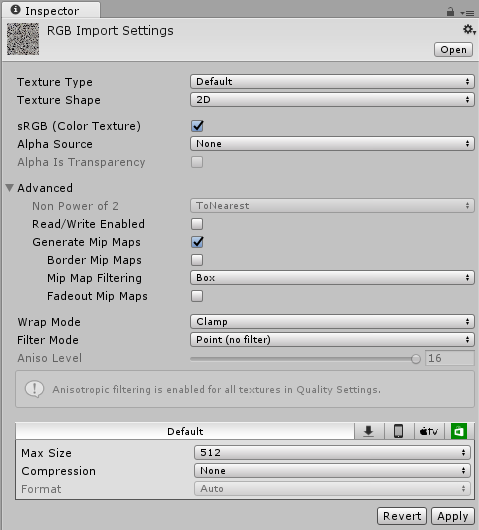
| Property: | Function: |
|---|---|
| Texture Type | Default is the most common setting used for all Textures. It provides access to most of the properties for Texture importing. |
| Texture Shape | Use this to define the shape of the Texture. See documentation on the Texture Importer for information on all Texture shapes. |
| sRGB (Color Texture) | Check this box to specify that the Texture is stored in gamma space. This should always be checked for non-HDR color Textures (such as Albedo and Specular Color). If the Texture stores information that has a specific meaning, and you need the exact values in the ShaderA small script that contains the mathematical calculations and algorithms for calculating the Color of each pixel rendered, based on the lighting input and the Material configuration. More info See in Glossary (for example, the smoothness or the metalness), uncheck this box. This box is checked by default. |
| Alpha Source | Use this to specify how the alpha channel of the Texture is generated. This is set to None by default. |
| None | The imported Texture does not have an alpha channel, whether or not the input Texture has one. |
| Input Texture Alpha | This uses the alpha from the input Texture if a Texture is provided. |
| From Gray Scale | This generates the alpha from the mean (average) of the input Texture RGB values. |
| Alpha is Transparency | If the alpha channel you specify is Transparency, enable Alpha is Transparency to dilate the color and avoid filtering artifacts on the edges. |
| Advanced | See Texture Importer. |
| Wrap Mode | See Texture Importer. |
| Filter Mode | See Texture Importer. |
| Aniso Level | See Texture Importer. |
Texture type: Normal Map
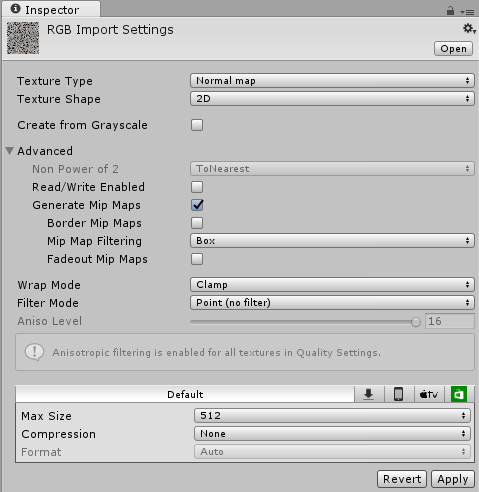
| Property: | Function: |
|---|---|
| Texture Type | Select Normal mapA type of Bump Map texture that allows you to add surface detail such as bumps, grooves, and scratches to a model which catch the light as if they are represented by real geometry. More info See in Glossary to turn the color channels into a format suitable for real-time normal mapping. |
| Texture Shape | Use this to define the shape of the Texture. See documentation on the Texture Importer for information on all Texture shapes. |
| Create from Greyscale | This creates the Normal Map from a greyscale heightmapA greyscale Texture that stores height data for an object. Each pixel stores the height difference perpendicular to the face that pixel represents. See in Glossary. Check this to enable it and enabled it and see the Bumpiness and Filtering. This option is unchecked by default. |
| Bumpiness | Control the amount of bumpiness. A low bumpiness value means that even sharp contrast in the heightmap is translated to gentle angles and bumps. A high value creates exaggerated bumps and very high-contrast lighting responses to the bumps. This option is only visible if Create from Greyscale is checked. |
| Filtering | Determine how the bumpiness is calculated: |
| Smooth | This generates Normal Maps with standard (forward differences) algorithms. |
| Sharp | Also known as a Sobel filter, this generates Normal Maps that are sharper than Standard. |
| Advanced | See Texture Importer. |
| Wrap Mode | See Texture Importer. |
| Filter Mode | See Texture Importer. |
| Aniso Level | See Texture Importer. |
Texture type: Editor GUI and Legacy GUI
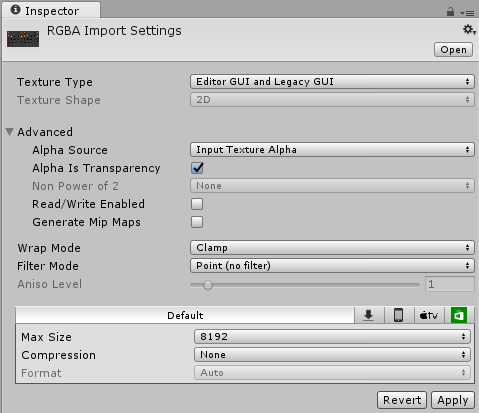
| Property: | Function: |
|---|---|
| Texture Type | Select Editor GUI and Legacy GUI if you are using the Texture on any HUD or GUI controls. |
| Texture Shape | Use this to define the shape of the Texture. See documentation on the Texture Importer for information on all Texture shapes. |
| Advanced | See Texture Importer. |
| Wrap Mode | See Texture Importer. |
| Filter Mode | See Texture Importer. |
| Aniso Level | See Texture Importer. |
Texture type: Sprite (2D and UI)
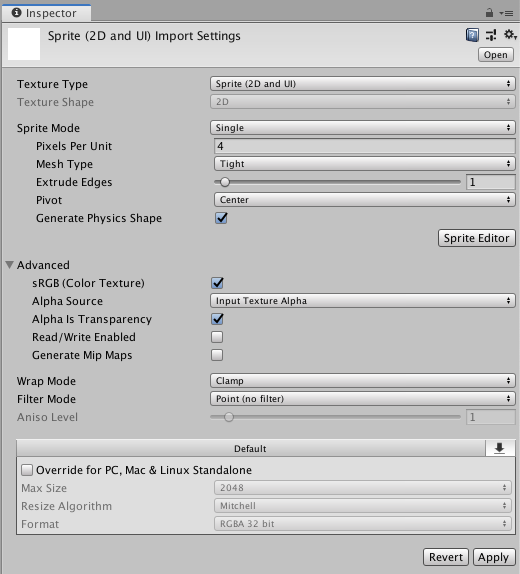
| Property: | Function: |
|---|---|
| Texture Type | Select Sprite (2D and UI) if you are using the Texture in a 2D game as a SpriteA 2D graphic objects. If you are used to working in 3D, Sprites are essentially just standard textures but there are special techniques for combining and managing sprite textures for efficiency and convenience during development. More info See in Glossary. |
| Texture Shape | Use this to define the shape of the Texture. See documentation on the Texture Importer for information on all Texture shapes. |
| Sprite mode | Use this setting to specify how the the Sprite graphic is extracted from the image. The default for this option is Single. |
| Single | Use the Sprite image in isolation. |
| Multiple | Keep multiple related Sprites together in the same image (for example, animation frames or separate Sprite elements that belong to a single game character). |
| Packing Tag | Specify by name a Sprite atlasA texture that is composed of several smaller textures. Also referred to as a texture atlas, image sprite, sprite sheet or packed texture. More info See in Glossary which you want to pack this Texture into. This property is visible only when you enable the Legacy Sprite Packer in your Project. |
| Pixels Per Unit | The number of pixelsThe smallest unit in a computer image. Pixel size depends on your screen resolution. Pixel lighting is calculated at every screen pixel. More info See in Glossary of width/height in the Sprite image that correspond to one distance unit in world space. |
| Mesh Type | This defines the MeshThe main graphics primitive of Unity. Meshes make up a large part of your 3D worlds. Unity supports triangulated or Quadrangulated polygon meshes. Nurbs, Nurms, Subdiv surfaces must be converted to polygons. More info See in Glossary type that is generated for the Sprite. The default for this option is Tight. |
| Full Rect | This creates a quadA primitive object that resembles a plane but its edges are only one unit long, it uses only 4 vertices, and the surface is oriented in the XY plane of the local coordinate space. More info See in Glossary to map the Sprite onto it. |
| Tight | This generates a Mesh based on pixel alpha value. The Mesh generated generally follows the shape of the Sprite. Note: Any Sprite that is smaller than 32x32 uses Full Rect, even when Tight is specified. |
| Extrude EdgesA Texture property that enables you to define how much area to leave around a sprite in a generated mesh. See in Glossary |
Use the slider to determine how much area to leave around the Sprite in the generated Mesh. |
| Pivot | The location in the image where the Sprite’s local coordinate system originates. Choose one of the pre-set options, or select Custom to set your own Pivot location. |
| Custom | Define the X and Y to set a custom Pivot location in the image. |
| Generate Physics Shape | When this is enabled and you have not defined a Custom Physics Shape for this Sprite, Unity generates a default Physics Shape from the outline of the Sprite. |
| Advanced | See Texture Importer. |
| Wrap Mode | See Texture Importer. |
| Filter Mode | See Texture Importer. |
| Aniso Level | See Texture Importer. |
Texture type: Cursor
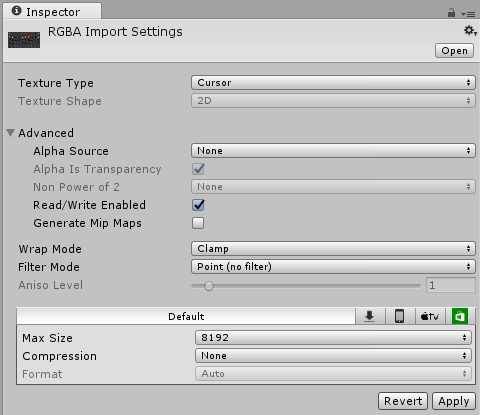
| Property: | Function: |
|---|---|
| Texture Type | Select Cursor if you are using the Texture as a custom cursor. |
| Texture Shape | Use this to define the shape of the Texture. See documentation on the Texture Importer for information on all Texture shapes. |
| Advanced | See Texture Importer. |
| Wrap Mode | See Texture Importer. |
| Filter Mode | See Texture Importer. |
| Aniso Level | See Texture Importer. |
Texture type: Cookie
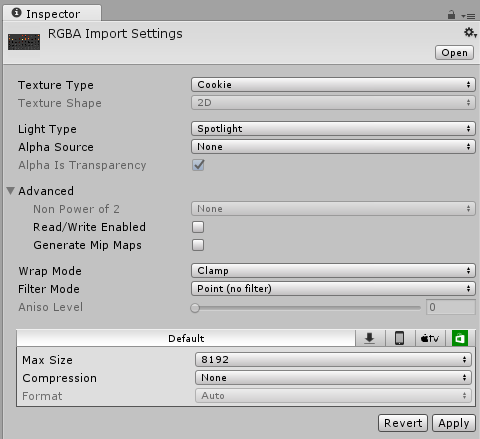
| Property: | Function: |
|---|---|
| Texture Type | Select Cookie to set your Texture up with the basic parameters used for the Cookies of your SceneA Scene contains the environments and menus of your game. Think of each unique Scene file as a unique level. In each Scene, you place your environments, obstacles, and decorations, essentially designing and building your game in pieces. More info See in Glossary’s Lights. |
| Texture Shape | Use this to define the shape of the Texture. See documentation on the Texture Importer for information on all Texture shapes. |
| Light Type | Define the type of Light that the Texture is applied to. Directional and Spotlight cookies must be 2D Textures, and Point Light Cookies must be cubemaps. The system automatically enforces the right shape depending on the Light type. For Directional Lights this Texture tiles, so in the Texture inspector set the Edge Mode to Repeat. For Spotlights, keep the edges of your Cookie Texture solid black to get the proper effect. In the Texture Inspector, set the Edge Mode to Clamp. |
| Alpha is Transparency | If the alpha channel you specify is Transparency, enable Alpha is Transparency to dilate the color and avoid filtering artifacts on the edges. |
| Advanced | See Texture Importer. |
| Wrap Mode | See Texture Importer. |
| Filter Mode | See Texture Importer. |
| Aniso Level | See Texture Importer. |
Texture type: Lightmap
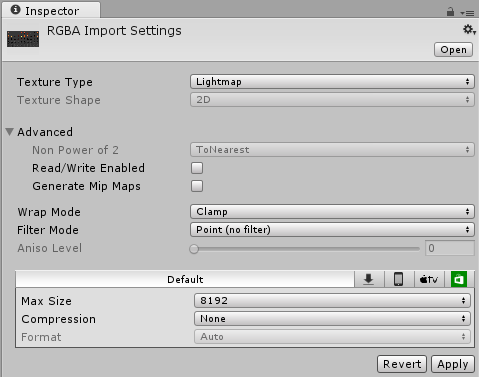
| Property: | Function: |
|---|---|
| Texture Type | Select LightmapA pre-rendered texture that contains the effects of light sources on static objects in the scene. Lightmaps are overlaid on top of scene geometry to create the effect of lighting. More info See in Glossary if you are using the Texture as a Lightmap. This option enables encoding into a specific format (RGBM or dLDR, depending on the platform) and a post-processingA process that improves product visuals by applying filters and effects before the image appears on screen. You can use post-processing effects to simulate physical camera and film properties, for example Bloom and Depth of Field. More info post processing, postprocessing, postprocess See in Glossary step on Texture data (a push-pull dilation pass). |
| Texture Shape | Use this to define the shape of the Texture. See documentation on the Texture Importer for information on all Texture shapes. |
| Advanced | See Texture Importer. |
| Wrap Mode | See Texture Importer. |
| Filter Mode | See Texture Importer. |
| Aniso Level | See Texture Importer. |
Texture type: Single Channel
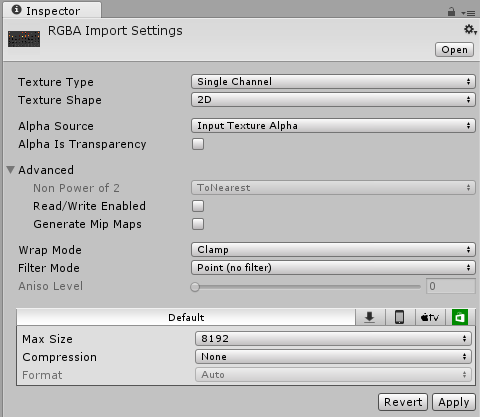
| Property: | Function: |
|---|---|
| Texture Type | Select Single Channel if you only need one channel in the Texture. |
| Texture Shape | Use this to define the shape of the Texture. See documentation on the Texture Importer for information on all Texture shapes. |
| Alpha Source | Use this to specify how the alpha channel of the Texture is generated. This is set to None by default. |
| None | The imported Texture does not have an alpha channel, whether or not the input Texture has one. |
| Input Texture Alpha | This uses the alpha from the input Texture if a Texture is provided. |
| From Gray Scale | This generates the alpha from the mean (average) of the input Texture RGB values. |
| Alpha is Transparency | If the alpha channel you specify is Transparency, enable Alpha is Transparency to dilate the color and avoid filtering artifacts on the edges. |
| Advanced | See Texture Importer. |
| Wrap Mode | See Texture Importer. |
| Filter Mode | See Texture Importer. |
| Aniso Level | See Texture Importer. |
Did you find this page useful? Please give it a rating: